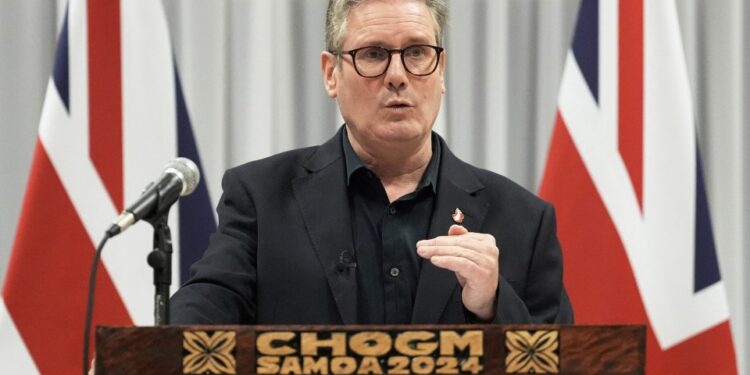SIR Keir Starmer denied lying to Brits over plans to hike their taxes – as he promised them “light at the end of the tunnel”.
Labour are expected to drop a £35 billion tax bomb on the UK in their Budget on Wednesday.
It includes a hugely controversial tax hike on employer National Insurance Contributions (NICs) by up to 2 per cent.
The move will cost firms up to £20 billion.
Speaking at a press conference in Samoa this morning, the PM insisted the pain would be worth it to fix Britain’s broken public services.
He said: “What I want to be judged on, one, have we made people better off?
READ MORE ABOUT THE BUDGET
“Do they feel better off under a Labour government because we fix the foundations.
“Secondly, that we genuinely pick the NHS up, put it back on its feet, but also at the same time reimagine it and make it fit for the future.
“That is as much about reform and technology as it is about money. There is no investment without reform as far as I’m concerned.”
Labour promised not to raise taxes on “working people” – including NICs, income tax and VAT.
But they have been accused of lying to Brits as Budget leaks suggest employer NICs will go up, while income tax thresholds will be frozen – forcing people to pay more tax on their wages.
Sir Keir was accused by ex-Tory Chancellor Lord Norman Lamont of stoking “class war”.
It came after he said that “working people” do not make money from renting property or owning stocks and shares.
Asked directly if he “misled” Brits with his tax pledge, the PM said: “No.”
He continued: “We were very clear about the tax rises that we would necessarily have to make up, whatever the circumstances and you’ve listed them there and I listed them, I don’t know how many times in the campaign.
“We were really clear in the manifesto about and in the campaign that we wouldn’t be increasing taxes on working people and spelt out what we meant by that in terms of income tax, in terms of NICs and in terms of VAT, and we intend to keep the promises that we made in our manifesto.”
What is the Budget?
THE Budget is big news and where you’ll often hear announcements about taxes. But what exactly is it?
The Budget is when the Government outlines its plans for the economy including taxation and spending.
The Chancellor of the Exchequer delivers a speech in the House of Commons and announces plans for things like tax hikes, cuts and changes to Universal Credit and the minimum wage.
At the same time, the Office for Budget Responsibility (OBR) publishes an independent analysis of the UK economy.
Usually, the Budget is a once-a-year event and usually takes place in the Autumn, with a smaller update known as the Spring Statement.
But there have been exceptions in recent years when there have been more updates, or the announcements have taken place at different times, for example during the pandemic or when there is a General Election.
On the day of the Budget, usually a Wednesday, the Chancellor is photographed outside No 11 Downing Street with the red box.
She then heads to the House of Commons to deliver her speech, at around 12.30 following Prime Minister’s Questions (PMQs).
Changes announced in the Budget are sometimes implemented the same day, while others may not have a set date.
For example, a change to tobacco duty usually happens on the same day, pushing up the price of cigarettes.
Some tax changes are set to come in at the start of a new tax year, which is April 6.
Other changes may need to pass through Parliament before coming into law.
Asked for his definition of “working people”, Sir Keir previously told Sky it was someone who “goes out and earns their living, usually paid in a sort of monthly cheque” but cannot “write a cheque to get out of difficulties”.
Pressed if this included people with assets, said: “Well, they wouldn’t come within my definition.”
Tory shadow minister Claire Coutinho blasted: “Keir Starmer went into an election saying he’d protect working people only to define that as a subset of people with jobs once he won.
“Labour either had no plan for post election or straight up lied to the public on multiple fronts.”
The warning came as Rachel Reeves sparked fears of mortgage rate pain after ripping up her debt rules.
The Chancellor confirmed plans to change the way national debt is calculated to hand herself up to £50billion more to play with at next week’s Budget.
It will let her embark on a massive borrowing spree to fund key manifesto pledges while still claiming to have met her promise to have debt falling in five years’ time.
But the financial fiddling risks spooking the markets in a Liz Truss-style panic, with government borrowing costs sent soaring yesterday as a result.
Shadow Chancellor Jeremy Hunt said the move could force interest rates to remain high for longer and wreak more misery on homeowners remortgaging.











